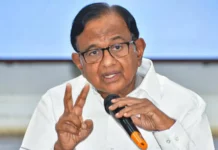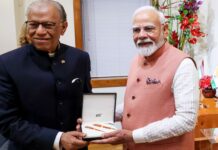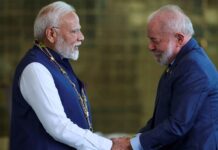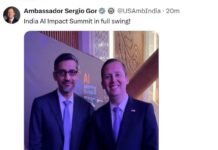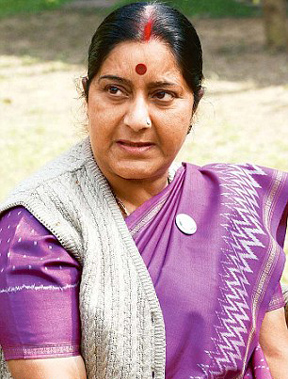 BHUBANESWAR: Describing maritime security as a key dimension of its bilateral ties with Indian Ocean rim countries, India today said it values its trilateral maritime security cooperation with Sri Lanka and Maldives and was trying to expand it to include others.
BHUBANESWAR: Describing maritime security as a key dimension of its bilateral ties with Indian Ocean rim countries, India today said it values its trilateral maritime security cooperation with Sri Lanka and Maldives and was trying to expand it to include others.
“Maritime security is an important dimension of India’s bilateral relations with Indian Ocean Littoral states and through various formal and informal structures currently in place,” External Affairs Minister Sushma Swaraj said here.
Swaraj was speaking after inaugurating an International Conference on “India and Indian Ocean: Renewing the Maritime Trade and Civilisational linkages.”
“We value our trilateral maritime security cooperation with Sri Lanka and Maldives. We are exploring possibilities of expanding it to include others in the Indian Ocean Region in particular Seychelles and Mauritius,” she said.
The External Affair Minister said Indian Navy has been playing an important role in this through increased bilateral /multilateral maritime exercises including MILAN which saw participation from 17 regional navies off the Andaman Coast in February 2014.
India looks forward to building closer cooperation in maritime domain, regularize bilateral maritime exercises and strengthen dialogues between the navies and Coast Guards with all littoral countries in the Indian Ocean Region, she said.
India is part of various multilateral institutions, which are actively debating maritime security issues in the Asia Pacific region, Swaraj said, adding that Indian Ocean Naval Symposium, which India founded in 2008, has 35 countries participating in its various activities.
“The effort has gathered momentum and deepened mutual understanding on maritime challenges and has strengthened our collective ability to address them,” she said.
As a founder member of the Contact Group on Piracy, India has been sensitive to the maritime security situation in the Gulf of Aden for shipping lanes in this part of the Indian Ocean, Swaraj said adding India has been working with like-minded countries to preserve the integrity, inviolability and security of maritime domain which is a global commons.
“We are committed to maritime security, freedom of navigation, unimpeded lawful commerce and peaceful settlement of disputes in accordance with international law,” she said.
The Minister, however, lamented that full potential of intra-regional trade remains untapped because of poor communication and transport links, lack of information about the supply capabilities, among other barriers. “The ports in most part of the region need to be modernized and equipped with multi-modal transport. Customs and clearance procedures at borders need to be streamlined,” Swaraj said, adding that intra-regional investment is still negligible despite tremendous potential.
“Deepening of regional economic integration may help in exploiting this hidden potential of intra-regional cooperation for mutual benefit.”
Addressing the meet, Odisha Chief Minister Naveen Patnaik said “we have the opportunity to reclaim our trade and cultural relations with nations in the Indian Ocean region.
Therefore, we must develop a comprehensive geo-strategic policy that promotes mutually beneficial engagements on an umbrella of issues relating to trade, culture, security and environment.”
Noting that Indian Ocean carries half of world’s container shipments, one-third of bulk cargo traffic and two-thirds of oil shipments, Swaraj said 90 per cent of our trade by volume and 90 per cent of oil imports take place through sea.
“The vast Indian Ocean region hosts over 40 states and nearly 40 per cent of world population,” she said, adding that the region – which extends from African coast to West Asia, South Asia and South East Asia and touches Australia – has been a focus of India’s foreign policy.
Referring to Prime Minister Narendra Modi’s visit to countries of the region, Swaraj said, “We call this Indian Ocean outreach as ‘SAGAR’. As Prime Minister said in Mauritius last week, we seek a future for Indian Ocean that lives up to the name of SAGAR- Security and Growth for All in the Region.”
Stating that India’s vision for Indian Ocean Region is built on fostering cooperation and assisting our maritime neighbors and island states in building their maritime security capabilities, she said, “We believe that we will prosper when the seas are safe, secure and free for all. We, therefore, have advocated collective action and cooperation.
Those who live in this region have the primary responsibility for peace, stability and prosperity in the Indian Ocean.”
Noting that Indian Ocean has acquired new salience with the shift of global economic engines to Asia, Swaraj said there has been sustained economic growth in the countries on the littoral of the Indian Ocean and growing global stakes and presence in the region is foreseen.–PTI

